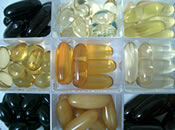 |
Policosanol
Policosanol is a mixture of essential alcohols isolated from sugar cane wax. The main constituents are octacosanol (66%), hexacosanol (7%), and triacontanol (12%). Eicosanol, tetracosanol, nonacosanol, dotriacontanol, tetratriacontanol and heptacosanol make up the remaining 15% of essential alcohols.
There is a significant body of evidence demonstrating the benefits of policosanol with respect to cardiovascular disease. In the mid to late nineties, one research group proposed that policosanol was able to reduce endothelial damage by inhibiting the production of foam cells. Foam cells are macrophages that can migrate into the endothelium of the blood vessels and contribute to atherosclerotic plaque formation . Other researchers believe policosanol has a modulating effect on HMG-CoA reductase, the rate-controlling enzyme in cholesterol biosynthesis, but the precise mechanism remains unclear . Still, other investigators believe policosanol may inhibit cholesterol synthesis in the liver at a step before mevalonate production, but total inhibition of the HMG-CoA reductase is doubtful . More recent work suggests policosanol inhibits LDL cholesterol oxidation . This was revealed when markers of peroxidation, such as thiobarbituric acid reactive substances (TBARS), and malondialdehyde (MDA) were lower in the cultures treated with policosanol. Oxidation of LDL cholesterol has been linked to heart disease and was the recent cover story in Scientific American magazine . Bi-products of LDL oxidation are bioactive, and secrete inflammatory cytokines, growth factors and cell surface adhesion molecules. In response to these oxidative bi-products, smooth muscle cells proliferate in the wall of the artery, resulting in the narrowing of the lumen and eventual blockage. Oxidized LDL cholesterol can also inhibit the production of prostacyclin and nitric oxide, which act as vasodilators and inhibitors of platelet aggregation.
|

